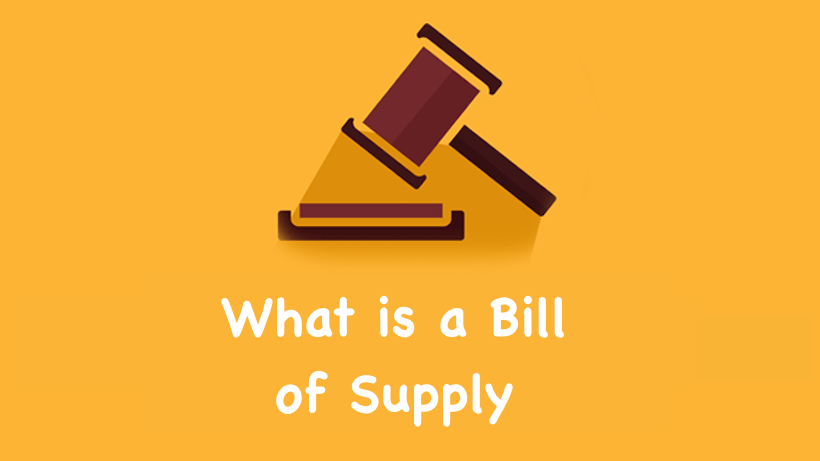Bill of Supply: A bill of supply referred to in clause (c) of sub-section (3) of section 31 shall be issued by the supplier containing the following details. A business registered under GST issues atax invoiceto the buyer. Such an invoice mentions the GST rate charged on the goods and services sold.
- (a) name, address and GSTIN of the supplier;
- (b) a consecutive serial number, in one or multiple series, containing alphabets or numerals or special characters – hyphen or dash and slash symbolised as “-” and “/”respectively, and any combination thereof, unique for a financial year;
- (c) date of its issue;
- (d) name, address and GSTIN or UIN, if registered, of the recipient;
- (e) HSN Code of goods or Accounting Code for services;
- (f) description of goods or services or both;
- (g) value of supply of goods or services or both taking into account discount or abatement, if any; and
- (h) signature or digital signature of the supplier or his authorized representative:
Provided that the provisos to rule 46 shall, mutatis mutandis, apply to the bill of supply issued under this rule.
However, somebusinesseseven though registered under GST cannot charge any tax on the invoice issued by them. Such dealers have to issue a Bill of Supply.
A Bill of Supply is issued when GST is not applicable on a transaction or when GST is not to be recovered from the customer.
Advertisement
Content in this Article
1. Who should issue Bill of Supply?
The following registrants should issue Bill of Supply:
A. Composition Dealer
A taxpayer whose turnover is less than Rs 75 lakh can opt forcomposition scheme. A dealer opting for composition scheme has to deposit tax on their receipts themselves, they are not allowed to collect any tax from their buyers. The GST has to be paid out of pocket by the composition dealer. They cannot charge GST in the invoice.
Thus a composition dealer has to raise a Bill of Supply instead of a Tax Invoice.
The composition dealer has to mention the words ‘composition taxable person not eligible to collect taxes on supplies’ on the Bill of Supply.
B. Exporters
An exporter is also not required to charge GST on their invoice. This is becauseexports supplies are zero-rated. Hence a taxpayer exporting goods can issue a Bill of Supply in place of a tax invoice.
The dealer has to mention the following in their Bill of Supply-
“Supply Meant For Export On Payment Of IGST”
“Supply Meant For Export under Bond Or Letter of Undertaking Without Payment Of IGST”
C. Exempted Goods Supplier
When registered dealer suppliesexempt goodsor services they are required to issue Bill of Supply.
For example, when a registered taxpayer provides unprocessed agricultural products they have to issue a Bill of Supply instead of a tax invoice.
2. Contents of Bill of Supply
A bill of supply shall be issued by the supplier containing the following details:
These are the details a Bill of Supply should have:
1. Name, address, andGSTINof the supplier
2. Bill of Supply number (it must be generated consecutively and each Bill of Supply will have a unique number for that financial year)
3. Date of issue
4. Name, address and GSTIN or UIN, if registered, of the recipient
5.HSN Codeof goods or Accounting Code for services. The number of digits that are required to be mentioned based on turnover is as follows:
| Turnover | No. of HSN digits |
| Turnover less than 1.5 crores | HSN code is not required |
| Turnover between 1.5 -5 crores | 2-digit HSN code |
| Turnover above 5 crores | must use 4-digit HSN code |
6. Description of goods or services or both
7. Value of supply of goods or services or both taking into account discount or abatement, if any
8. Signature or digital signature of the supplier or his authorized representative
Manner of issuing invoice [Rule 48 of the CGST Act, 2017]:
(1) The invoice shall be prepared in triplicate, in the case of supply of goods, in the following manner, namely – by marking on face of the invoice
- (a) ORIGINAL FOR RECIPIENT;
- (b) DUPLICATE FOR TRANSPORTER; and
- (c) TRIPLICATE FOR SUPPLIER.
(2) The invoice shall be prepared in duplicate, in the case of the supply of services, in the following manner, namely-
- (a) ORIGINAL FOR RECIPIENT; and
- (b) DUPLICATE FOR SUPPLIER.
(3) The serial number of invoices issued during a tax period shall be furnished electronically through the common portal in FORM GSTR 1.

